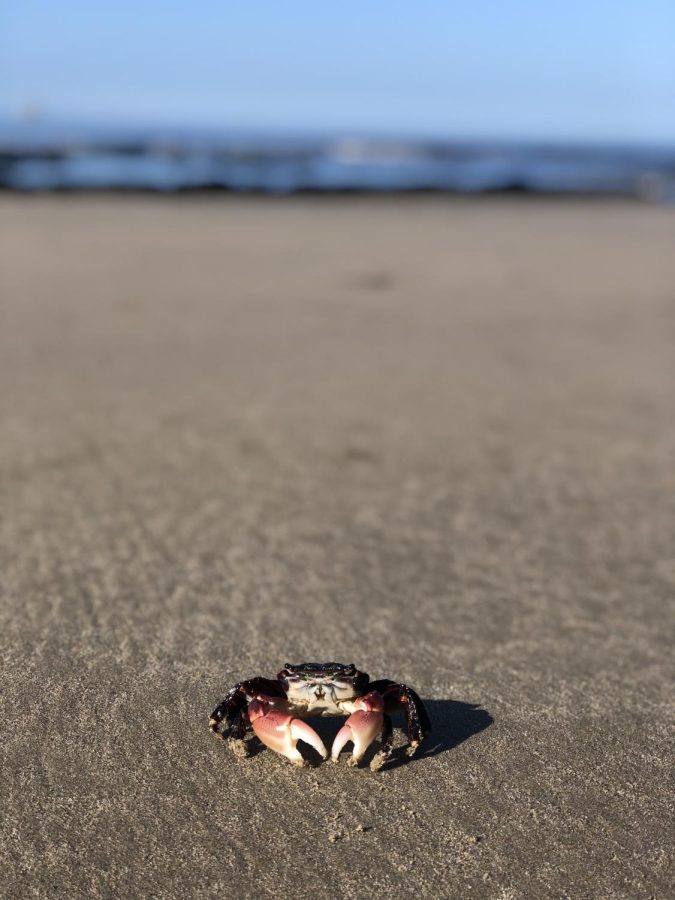A black Ariel is now part of our world
Diving under the sea of controversy surrounding Disney’s casting of a black actress as the live-action Ariel
Daveed Diggs will play Sebastian in the live-action “Little Mermaid.”
October 1, 2022
LOS ALAMITOS, CA — Halle Bailey will star as Ariel in Disney’s live-action “The Little Mermaid” on May 26, 2023. The first African American live-action Disney princess, Bailey represents a step towards more diversity and inclusion in the film industry. But #notmyariel has spread across social media as people contest a black actress being cast as an originally light-skinned character. Bailey’s race should not define whether she should play Ariel because Ariel is an animated, fictional, MERMAID.
“Considering mermaids are supposed to live underwater where there isn’t any [sunlight,] they wouldn’t need any melanin in their skin. So if mermaids existed then they would be very, very pale-skinned. Besides the character Ariel is white. I wonder how she’s managed to change race,” said one tweet.
If “mermaids existed”? They don’t. Mermaids are made-up creatures rooted in mythology, so the rules of science do not apply. Scientifically, there shouldn’t be mermaids in the movie, Flounder and Sebastian shouldn’t talk, and Ursula shouldn’t sing a killer solo. Arguments of unrealisticness are futile because it’s a fictional movie. It’s not supposed to be realistic.
People dislike that Disney is changing the “original” “Little Mermaid.” But the 1989 movie is not the original. It’s based on the fairy tale written by Hans Christian Anderson, where the little mermaid doesn’t even have a name, the sea witch cuts out her tongue to give her legs, her sisters cut off all their hair to save her, and she turns into sea foam to escape stabbing her prince in the heart. If people want the original “Little Mermaid,” they should also be arguing why Disney’s mermaid has a name and a tongue.
Others argue that since Anderson was Danish, Ariel should be too. Disney’s Ariel is not the same as Anderson’s little mermaid. The movie is loosely based on the fairy tale, so Disney has the freedom to give Ariel any skin color they want. In the 1989 movie, Ariel was born in the fictional underwater kingdom of Atlantica, which technically makes her Atlantican, not Danish. As Ariel is half fish, she cannot be categorized by our ethnicities and races. The animated “Little Mermaid” movie only portrayed her with light skin and red hair because that was the American interpretation at the time.
Additionally, there are Africans in Denmark. Freedom is Mine, a platform that teaches awareness of the worldwide African diaspora, said that of the 6 million people in Denmark, less than 120,000, or 2%, are black. Although they are a minority, a number of Africans do live in Denmark. So arguably, the little mermaid could be Danish and black.
“We [have to] redo all the movies now,” someone tweeted with a photo of other Disney princesses, like Pocahontas and Mulan, with different races.
Changing the race of Ariel is in no way the same as changing the races of princesses like Pocahontas and Mulan. Their cultures are essential to their characters and storylines. Both films are filled with Native American and Chinese respectively food, clothing, and cultural practices.
It would make zero sense for an actress of any ethnicity other than Chinese to play Mulan, a Chinese warrior in China. And in “Pocahontas,” white settlers try to take over her tribe’s land, so she cannot be played by a white actress. Also, Pocahontas is based on a real Native American woman named Pocahontas. Ariel is, once again, a fictional character. She was not based on a real person because she is a mermaid.
“I think the main purpose of the live-action version is to convey the story of Ariel, and her story is not affected by her skin color,” a Los Alamitos High School student said in a survey by the Griffin Gazette.
Furthermore, Anderson did not invent mermaids. Other cultures have versions of mermaid myths too. Anderson published “The Little Mermaid” in 1837. According to Smithsonian magazine, the African water spirit Mami Wata, depicted with long hair and a fishtail, existed as early as the 1400s. People use weak history- and science-based arguments to cover up the fact that they simply feel uncomfortable with change and a black woman as a classically light-skinned character.
“People don’t [realize] what Disney is doing to our childhood movies that we grew up [with]. I’m not racist to [a] new one. But let’s get one thing straight, I would NEVER go see that. They already destroyed the little mermaid from our childhood,” someone tweeted with #NOTMYARIEL.
“We must boycott the new ‘Little Mermaid’ movie,” read another tweet.
The new “Little Mermaid” is not replacing the old one. If people prefer the 1989 version, they can watch it anytime and choose not to watch the live-action movie if they disagree with it. For children today, Bailey’s Ariel is the little mermaid of their childhood. Parents can decide what they want their kids to watch, but they have no right to tell other people to boycott this movie. Especially considering the young black girls across the country who are ecstatic there is finally a live Disney princess who looks like them.
As of 2022, there are currently no black live-action Disney princesses, so Bailey is the first actress to represent a princess in which African American girls can truly see themselves. Seven out of the 13 official Disney princesses are white; the only African American princess is Tiana, from “The Princess and the Frog.” Young black children deserve to see someone who looks like them on screen playing a beloved character as much as white children do.
A Los Al student said that #notmyariel seems “blatantly racist.” Critics are attacking Bailey solely because she is black. They make no mention of her acting or singing abilities that qualify her for the role. Director Rob Marshall chose her for her enchanting voice and ability to channel Ariel’s passionate personality. Bailey’s race shouldn’t matter because she has the skills required to play the part.
“Personally, I have always known Ariel to be a 16-year-old mermaid with the reddest hair in the sea and a splendid voice. If they can make that accurate, I feel like she IS the little mermaid,” another student said.
People post intentionally inflammatory comments, hidden by anonymity on social media, to attract more attention and debate on a subject that shouldn’t even be debated. Disney felt that Bailey was the most qualified actress to play Ariel, so they cast her. The end. However, “The Little Mermaid” (2023) videos received nearly 3 million dislikes and so much negative feedback that YouTube removed offensive comments and the dislike feature on trailers.
Despite all the backlash, “The Little Mermaid” is still coming out in May of next year and Bailey is still playing Ariel. Negative comments do nothing to affect this outcome. Social media is also filled with positive posts supporting Bailey and opposing those poor, unfortunate souls trying to bring her down.
The bottom line is: Ariel is a non-human, fictional creature who cannot be bound by our society’s racial stereotypes. Bailey deserves to be Ariel, regardless of her skin color.
Watch the trailer here.






Ellen Honey • Jun 24, 2024 at 10:47 am
As a red headed child in the 80s it was really monumental to finally have a disney princess that represented me. Now we have several red headed disney princesses. I think it’s terrible that it’s taken this long for African American kids to have that. Ariel will always be ‘my disney princess’ and I’m more than happy to share her. Changing the colour of Ariels skin does not take anything away from my experience.
Chris Ringgold • May 21, 2024 at 9:08 am
Point well taken. I agree
Sydney Forsyte • May 12, 2023 at 2:10 pm
This article is amazing, Bella! I really love how eloquently you express your opinions through your writing. Good job!
Kate Schumacher • May 12, 2023 at 2:08 pm
YES BELLA!! this article is amazing so proud
Jordan Freeman • May 12, 2023 at 12:56 pm
Great job Bella! Your article is very well informed and eloquent 🙂
Katie Arnoult • May 12, 2023 at 9:36 am
YEAAA BELLA!! Love this article, you did a great job on it!
Alicia Tan • May 12, 2023 at 9:33 am
This is such a well written, insightful article! Representation is key to creating a more understanding and empathetic world. I completely agree with you on all points!!!
Rosie • Apr 27, 2023 at 9:33 pm
Disney is ruining what used to be my favorite stories. So disappointed. Is it really necessary? I won’t be seeing or supporting any of their nonsense.
Vallarey • Jul 6, 2023 at 1:41 am
And you have every right to do that, however how is creating remakes with live characters taking away from original movies? Original movies still exist and aren’t being destroyed in lieu of the new ones.
And yes, it IS necessary. Representation matters.
Jo-Jo • May 13, 2025 at 11:09 pm
Representation and diversity would be best served by creating new tales show casing black or brown princes and princesses. Why is this never pursued?
Regardless of any inclusion effort, The Little Mermaid will always be remembered with pale white skin and bright flowing red hair.